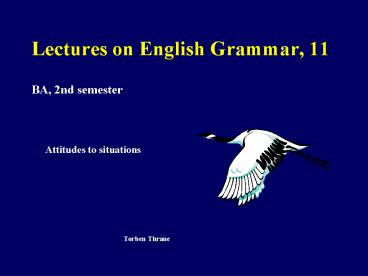Lectures on English Grammar, 11 PowerPoint PPT Presentation
1 / 24
Title: Lectures on English Grammar, 11
1
Lectures on English Grammar, 11
- BA, 2nd semester
- Attitudes to situations
- Torben Thrane
2
Communications Model
Context
Channel
Sender
Receiver
Message
Channel
Code
3
Speakers attitudes towards described situations
Context
Channel
Sender
Receiver
Message
Channel
Code
4
Attitude reports and modalities
Two areas of grammar
- propositional attitudes - speech acts and
performatives - the speakers attitude towards the described
situation
- modality - modal verbs and adverbs
- the speakers judgement of the described
situation
5
Attitude and modality markers
Complement
I think that you should leave
I think
should
you leave
subordination marker
Attitude marker
modality marker
proposition
6
Attitude reports
I think
These verbs are also called cognitive or
mental verbs.
I believe
I trust
I know
(that) everybody is bringing something to eat
I regret
I suppose
Grammatically, they demand a clause as complement
I understand
I wish
etc.
7
Structural types of AR verbs (incomplete)
Direct object
John wished (that) the show started at 8
that-clause
John knew what the show was about
what-clause
John wished to wait for the bus
infinitive-clause
John wished for Jill to wait for the bus
for-infinitive-clause
There is great individual variation from verb to
verb with respect to complementation type.
8
Performatives
John promised that he would bring something to eat
John warned us that he would bring something to
eat
John threatened that he would bring something to
eat
They asked if John would be chef for the evening
They appointed John chef of the evening
They christened their new baby John
etc
9
Speech acts (1)
Promises
- are things that only exist in the world
because someone has said something on some
occasion
Warnings
Threats
They are the results of particular speech acts.
Questions
Appointments
The study of speech acts - how they are
performed, what linguistic re- sources are
involved, what formal properties they have, etc.
- is a central concern of pragmatics.
Christenings
etc.
10
Speech acts (2)
Verbs that designate speech acts are called
performative or communication verbs
Grammatically, they take a clause as
comple- ment, sometimes with an extra NP or toNP
as indirect object
11
The structure of AR SA verbs
12
Structural types of SA verbs (incomplete)
Direct object
John said (that) the show started at 8
that-clause
John said what the show was about
what-clause
John said to wait for the bus
infinitive-clause
John said for Jill to wait for the bus
for-infinitive-clause
Note for Danes explain
John forklarede os hvad stykket handlede om John
forklarede til os hvad stykket handlede om
John explained us what the play was about John
explained to us what the play was about
13
Epistemic modality (again)
Last lecture dealt among other things with
the distinction between fact and possibility
Possibility is a notion which together with its
opposite - Necessity - forms the type of
modality which is called EPISTEMIC
There are two other main types of modality
DEONTIC and PRAGMATIC
14
Deontic modality
Speakers judgement of the described situation
I think that you should leave
but there is more to it
The subject s judgment of the described situation
John thinks that you should leave
Circumstantial propriety of the described
situation
(Its 3 oclock in the morning) you should leave
15
Circumstantial propriety
There are basically two sources of authority that
regulate behaviour
- The set of moral codes and norms in society
- Thou shalt not kill
- The set of legal rules and regulations in
society - All traffic must turn left
16
Modal meanings
Deontic
Pragmatic
Epistemic
(Logical) necessity
Obligation
Insistence
(Logical) possibility
Permission
Ability
X insists on Y X is not able not to Y
It is necessary that P It is not possible that
not-P
X is obliged to Y X is not permitted not to Y
It is possible that P It is not necessary that
not-P
X is permitted to Y X is not obliged not to Y
X is able to Y X does not insist on not-Y
17
Modal verbs
Epistemic
Deontic
Pragmatic
Ability
You can go now
Permission
You could go now
Possibility
Ability
Possibility
Permission
You may go now
You might go now
Possibility
You must go now
Necessity
Obligation
You ought to go now
Obligation
You shall go now
Obligation
Insistence
You should go now
Necessity
Obligation
You will go now
Obligation
Ability
You would go now
Insistence
18
Possibility, permission and ability
You can go now
As I do not prevent you, and you are able, you
go now
You could go now
As you are able to, it is possible that...
As there is nothing, including me, to prevent
you, it is possible that...
You may go now
You might go now
As there is nothing to prevent you, it is
possible that...
19
Necessity, obligation and insistence
You must go now
Circumstances/I demand that you go
You ought to go now
Circumstances dictate that you go now
You shall go now
I demand/insist that you go now
You should go now
Circumstances demand that you go now
You will go now
Oblige me, since you are able, to go now
20
Deontic modality (1)
Hypothesis (permission)
Time
US
Fact
Potential (pragmatic)
Time
Necessity (obligation)
21
Deontic modality (2)
can
Hypothesis (permission)
could
may
Time
must
ought to
Potential (pragmatic)
US
Fact
shall
should
Time
will
would
Necessity (obligation)
22
Semi-modals
dare not
pragmatic
need not
epistemic
have to
deontic
had better
deontic
have got to
deontic
be to
pragmatic
be about to
pragmatic
be going to
pragmatic
be sure to
epistemic
23
Modal adverbs
actually
pragmatic
obviously
pragmatic
possibly
epistemic
necessarily
epistemic
surely
epistemic
undoubtedley
epistemic
perhaps
epistemic
certainly
epistemic
probably
epistemic
etc. etc.
24
The structure of Modal Aux and Adverbs

